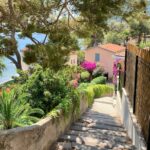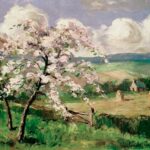On Holy Tuesday of the Holy Week, the parable of the talents is often read in churches with the addition of the parable of the ten virgins. In the parable of the talents, we reflect on the importance of being grateful for what we have been given, and through our dedication and effort we develop it further and share it with others for their betterment as well. I’ve talked about our gifts and talents many times before, as well as gratitude and humbleness and being in service to others, so today let’s dive into the parable of the ten virgins.
As always, please know that spiritual text is not to be interpreted through literalism. Literalism has no place in spirituality. Also, please keep in mind that this parable comes from Matthew, which was believed to have been written originally in Hebrew or Aramaic, and then translated in Greek; and now, depending on what English version you are reading, it may sound different. The Greek version is the one that is considered the widely accepted, but some early sources and linguistic evidence points to its Hebrew or Aramaic origins. As a mystic, I am not interested in debating or arguing about points of doctrines or translations, nor quibbling words, I am only sharing my spiritual insights and perspectives; but do keep in mind that as I already said, literalism has no place in spirituality. It’s something to be perceived through our heart and inner world rather than merely reading words.
The Parable of the Ten Virgins
In Matthew 25:1-13, the parable speaks of how the kingdom of heaven is like ten virgins who take their lamps and go to meet their bridegroom, who is Christ. Five of the virgins are wise, as they carry oil in little jars for their lamps to be lit; and the other five are unwise as they do not carry any oil for their lamps. When the bridegroom comes, only those with their personal oil and lit lamps enter the kingdom of heaven.
We often read about the kingdom of heaven, and in the gospels there are many phrases written as what Jesus may have said about it – and often times it comes in parables. Sometimes the heaven is like bread, sometimes a woman who feeds others, sometimes heaven is the mustard seed. And once was said heaven is where “there shall be time no longer.”
Where is time no longer? It’s only in the present moment – because time exists only as linear in relation to tomorrow and yesterday, the past and the future, it’s a horizontal thing. But when the past kisses the future in the present, the union becomes us in this timelessness of the present moment. This is the point of creation and where peace is also, which may sound very Zen, but I invite you to think about it.
How do we know we are not living in heaven right now and making a mess of it? Are we sleepy in our heaven, blinded, or lacking the light to see it? How do we know we are not already here in heaven? Why does Jesus always point to the heart, saying the kingdom of heaven is within? The heart is the initiatory portal to higher consciousness; the heart is out beating heart, our present moment, and this is where our inner Christ is, where the church is, where our faith is, and where the connection now is no longer horizontal and linear – it is now a non-linear vertical connection to God – starting from our heart and beyond the skies. It’s an inner pathway. An inner walk. The kingdom is within. We enter it through the purity of heart and love. The love, the gratitude, the wisdom, the everlasting life we enter through love in our present moment; for only true love is capable of timelessness, dissolving all boundaries.
Many people go to church but they do not carry Christ within them. Many people are devout Buddhists but they do not embody peace through their actions. Many people speak on big world stages about how we should care about the environment but they then turn to the person beside them and treat them with disrespect and arrogance. Many Hindus leave donations in the ashrams and pray and chant but then go outside and do not even look at the homeless woman with child at the doors of the ashrams.
This life is one of interdependence and love, learning to love, and if we only look to the sky to find God or worship structures and buildings, we won’t find God there; God is the eyes of those beside you, God is the love you choose to embody and in the movements of love through your hands and gestures, such as kindness, generosity, non-judgment, patience, gratitude. If we don’t awaken this God within us, light the flame within our own temple, we won’t find it outside.
So in this parable the first thing we see is the external – all ten are virgins and perhaps wearing the same clothes, i.e. physically or externally they look the same. Internally though are the souls. The lamps are the bodies, and perhaps our spiritual bodies. And the oil is that which lights them up – it is our deeds, virtues, everyday movements.
The Greek word for these oils in the Greek text is oleus, which is Greek is pronounced as eleos, meaning “mercy, compassion”.
In ancient Athens, eleos (Ancient Greek Ἔλεος m.) or elea was the personification of compassion. Within the New Testament, eleos is often used to describe God’s compassion and forgiveness towards humanity.
So what the oils show us is that these are our human abilities to show compassion, be merciful, and show kindness and mercy towards those who may be weaker or more vulnerable in some way. Our ability to not just speak of “love” but actually embody love, emit love, is what lights our inner lamps and lanterns and show us who we really are.
The external or physical isn’t enough, as the spiritual body evolves only through the devotion, faith, moral compass, virtue and love. It is about being merciful and kind and compassionate, not just sometimes but always. There is a temple of God within each person; for some it may be a sleeping God, for others an awakened one. Nonetheless we serve the temple of God within others, i.e. we try to stay away from judgments or shaming someone for their path or choices, and we stay in compassion for them. We seek to show light upon others not perpetuate their darkness. We recognize that God works through us as humans, through our hands, and giving and helping others is what we need to do. We can’t neglect mercy, compassion and kindness.
You may wonder: Why didn’t the wise virgins with the oil give the foolish ones oil? That’s a good question, and I remember I thought this myself the first time when I read this parable many years ago. Life reveals us its wisdom as time goes by and the years go, and today, as a spiritual practitioner working with clients for a decade, I understand why. Because as much as we want to give someone the oil, we can’t.
Those with the oil cannot give someone else oil. We can’t give someone wisdom, we can’t even give them love if we can’t receive it. We can stay in compassion for them, but we can’t give wisdom – it’s an inner pathway. We can give others insight, but whether or not they take their key is only their choice. We can’t give someone something that they don’t have already with them or that they can’t perceive. We can’t save others. It’s an inner awakening and lighting and nurturing of oils and lamps that needs to happen. We can’t walk someone else’s paths for them.
The energy of healing too works in similar ways. Healers don’t always “heal” others who can’t heal themselves, but it is just that the healer has a high purified energy, and by radiating this, the other people around the healer become aware of this energy of light and health, and this may shift them also by being in the presence of the healer.
Nurturing our own oil is something we need to tend to continuously. So may we love more consciously, more compassionately, and understand that perhaps this is heaven right here right now. The humility in this present moment, knowing that we all can support one another and raise one another and lift each other up is I believe something quite special. I think it is a gift to be born; to have eyes with which to see the smiles of your loved ones, to have hands with which to hug them, to have ears to hear laughter, noses to smell the beautiful flowers, and tongues with which to speak kindness to others rather than throw poisonous arrows, judge or criticize or speak badly behind people’s backs. There are choices to be made each day.
Wisdom is not just one virtue, it is all virtues in one. This parable has another deeper spiritual meaning, and it is that the five unwise virgins show the five silent senses i.e. when we are only driven with the outer senses. Emotions and reason need to be balanced, because those who only live by what they hear or see, without any emotional intelligence or clarity of mind, live in emptiness.
On the other hand, the five wise virgins with the oil symbolize the awakened inner senses; it shows spiritual growth and a balance between the emotional, spiritual, mental and physical bodies. They are able to wisely govern their senses, manage their lower urges healthily, and gather light throughout their life through their awakened inner being. This light and its flame are nourished through wisdom and self knowledge here in this life, and shine a light on any darkness outside of it.
The truth is that if you can’t find that light here, you won’t find it elsewhere; and you need to build your own oil to light your lamp to even see or realize where you are. The unwise virgins couldn’t see where they were, nor would they see or realize where they are within the darkness of space or the universe or earth itself.
There is so much to be thankful for, if we only truly realized the divine in this present moment, God moving through us, like breath. Free will is our ability to consciously choose to be more conscious, more aware, more attentive and better people, more kind, more patient, more non-judgmental. This life is precious; it allows us an opportunity for a deepening. We each have our lamps, it’s in our hands, may we choose to light them.
For personal readings with me, you are welcome to browse through my Offerings.

For more of my writings, browse through my Art of Love.
If you wish to support me and my work, you may do so by sharing it or donate here. For personal readings with me, you may visit my Offerings.
Your support means so much to me! Thank you wholeheartedly!
Cover art by Phoebe Anna Traquair, Parable of the Ten Virgins, Collection: Mansfield Traquair Church, Edinburgh, via Wikimedia Commons.




